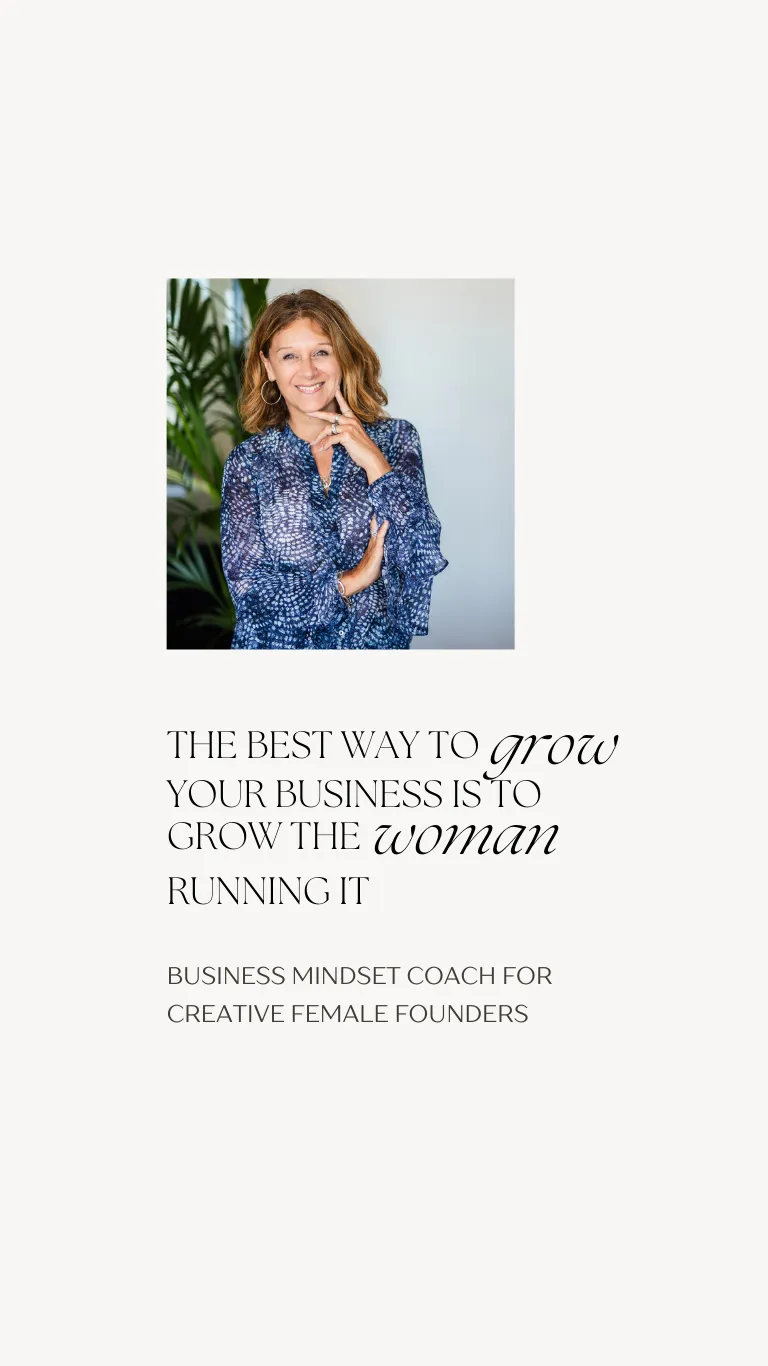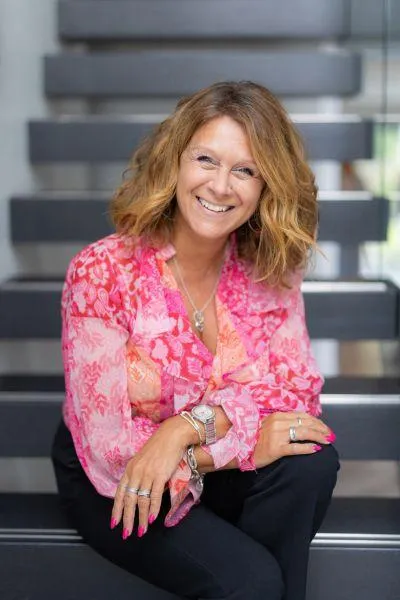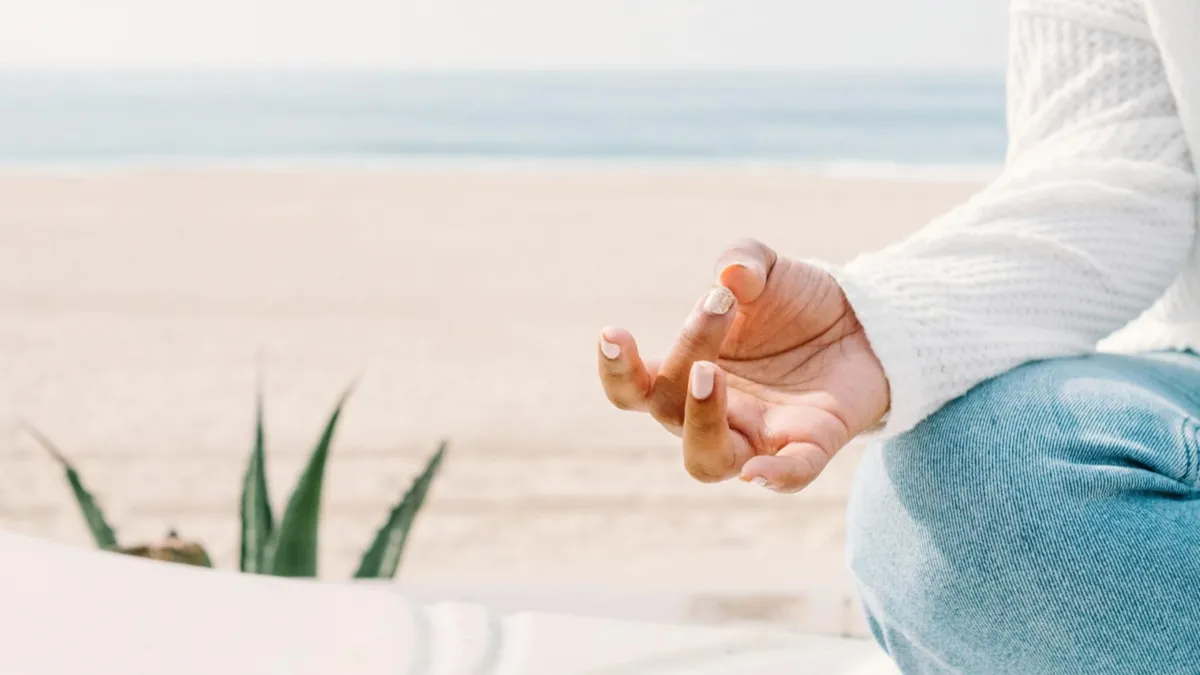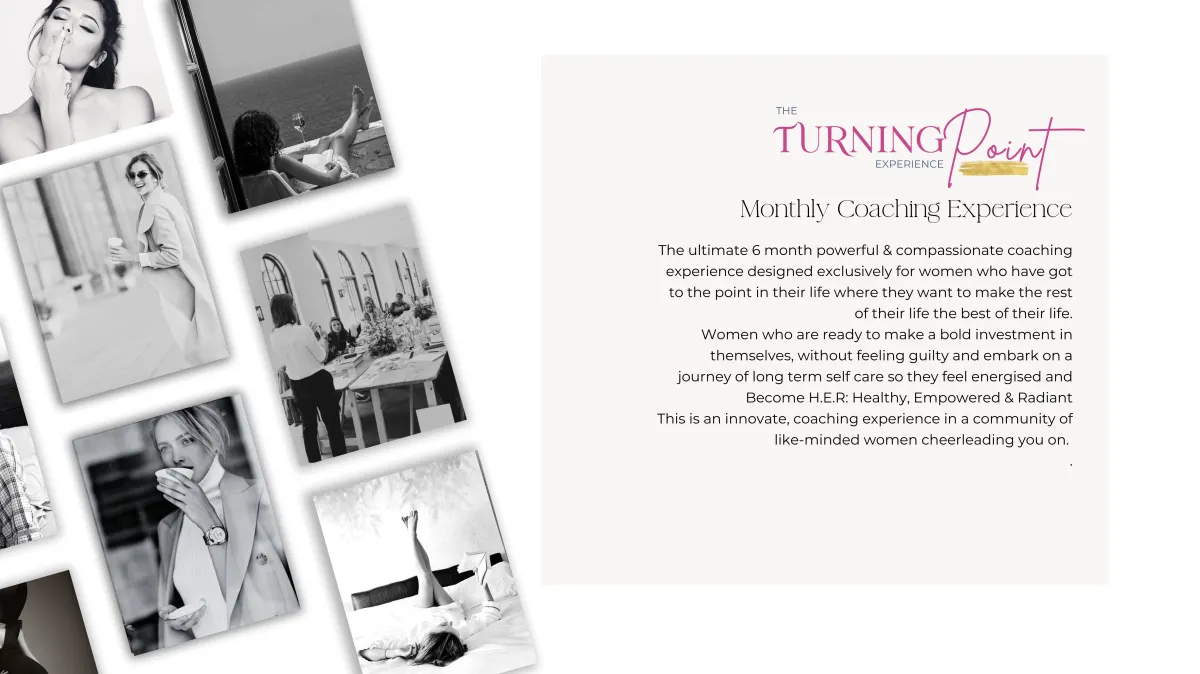Life Coaching for Smart Women at a Crossroads
About Suzy and her
Mission for you to

Business & Mindset Coach for
Creative Female Entrepreneurs
Helping you grow an incredible business by
growing the amazing women running it.

Welcome to Become HER Coaching
WHERE I SPECIALISE IN EMPOWERING CREATIVE
FEMALE BUSINESS OWNERS AND LEADERS
To embrace their individuality as a source of confidence and achieve the heights they dream of, without compromising or sacrificing their health, relationships and private lives.
ARE YOU READY TO BECOME HER? LET'S GET STARTED


I'm a passionate advocate for women's
empowerment, growth, self care and individuality.
With a blend of personal experiences, coaching strategies and methodologies, and powerful tools, I help women turn their visions into reality.
I find immense joy in sharing the invaluable lessons I've learned throughout my journey leading a successful exhibition design agency for more than 25 years.
My coaching style is a fusion of creativity, strategy, and unwavering support, using a combination of CBT, NLP and EFT modalities and I use a unique psychometric assessment for resilience & wellbeing at work (Wraw).
I believe that within each of us lies the strength to tackle life's challenges and that we don't need to "have it all"; we just deserve to have what we truly desire.
Are you ready to Become HER, an entrepreneur who embodies authenticity, innovation and impact?
BECOME HER
BECOME HER
When you work through my signature programme you embark on a life changing journey of transformation as we get laser focus on your Vision, Mindset, Strategy, Power, and Balance. Together, we tackle common challenges such as confidence, clarity, imposter syndrome, procrastination, decision-making, work/life balance, money mindset and the pursuit of growth and visibility. You will discover the three key invisible barriers to your success and how to break through them.
Become HER is a journey where you collect and collate all your wisdom, experience and knowledge, embrace your unique individuality and let it be the source of your confidence so you are unstoppable in your beliefs and what you can achieve.
When you work through my signature programme you embark on a life changing journey of transformation: Vision, Mindset, Strategy, Power, and Balance. Together, we tackle common challenges such as confidence, clarity, imposter syndrome, procrastination, decision-making, and the pursuit of growth and visibility. You will discover the three key invisible barriers to your success and how to break through them.
Become HER is a journey where you collect and collate all your wisdom, experience and knowledge, embrace your unique individuality and let it be the source of your confidence so you are unstoppable in your beliefs and what you can achieve.
MY MISSION
MY MISSION
To create a tribe—a community where women feel seen, heard, visible, and supported for their uniqueness, passions, and individuality. I'm dedicated to providing a space where women business owners can find a sense of belonging while stepping away from societal expectations and to use my gifts of experience, learning and belief to amplify the self-worth and net-worth of my clients.
To create a tribe, a community where women feel seen, heard, visible, and supported for their uniqueness, passions, and individuality. I'm dedicated to providing a space where women business owners can find a sense of belonging while stepping away from societal expectations and to use my gifts of experience, learning and belief to amplify the self-worth and net-worth of my clients.
BELIEVE | CREATE | BECOME
1:1 Coaching
Become HER Membership
VIP Mindset & Strategy Days
Group Programmes
Workshops
Retreats

The Smarter Way to Think About Your Business
Welcome to
My Blog Page
A collection of straight-talking pieces for women running real businesses.
Practical thinking. Useful perspective.
These articles come from the conversations that happen every week around pricing, clients, delivery models, time, and the role we play inside our own business.
If you are looking for a smarter way to run your business, you'll enoy these.

Behind the scenes of why mindfulness matters
““The happiness of your life depends upon the quality of your thoughts” Marcus Aurelius
Why mindfulness is more than just meditation
Mindfulness can help you manage and prevent feelings of depression, stress, anxiety, or discontent. It enables anyone who practices it to live a more attentive, appreciative and vibrant life.

Often people think that in order to be truly mindful we have to cleanse our minds of all perceptions or past experiences, halting or controlling our thoughts completely and existing with unconditional positivity. This is not the case at all.
Mindfulness does not ask us to stop or control our thoughts, judgements or negative experiences. Rather, it asks that within our experiences, we simply pay attention to what is happening in the moment.
This means allowing the thoughts that are often entangled with judgements, opinions and preferences, to be observed with compassion, awareness and non-judgement.
In addition to our approach to life and learning to control our thoughts the physiological and physical benefits are evident through much research. Research suggests that mindfulness benefits our bodies, not just our minds. It can help you get some peace and calm in your hectic life, help you relax and de-stress.
Studies to date suggest that mindfulness affects many aspects of our physiological well-being, as few as an example:
· Improving our mood
· Increasing positive emotions
· Decreasing anxiety
· Eliminating burnout
· Improved immune systems
· Improve insomnia
· Weightloss
· Increased self-esteem
· Decreased depression
There is evidence to show that your heightened self-awareness will mean you may notice and recognise any warning signs of illness. The emergence of long-term noncommunicable diseases and so called ‘lifestyle diseases’ as a major health issue around the world has put the spotlight on self-care. Through self-care, people can delay or prevent many chronic diseases such as coronary heart disease, strokes, diabetes and cancers, in which an unhealthy lifestyle is well established as a key causative agent.
By being self-aware we can also notice through our daily activities when we are not living our lives to the best. The average person checks in on their phone 52 times a day, which adds up to around four hours of staring at a screen!
We can also take back control of our time which will have an impact on stress levels. Every morning we wake up with the same 24 hours as everyone else. It is up to us what we do with those hours, to take back control through mindful intention and approach.
Jon Kabat -Zinn says having just 5 minutes a day focusing on thoughts that are not negative can have a significant impact on emotional health. Meditation is a way of practising mindfulness and a steady meditation practice is one of the best ways to help us develop mindfulness in our daily life. A daily meditation practice can offer enormous benefits for anyone wishing to live a more fulfilled and connected life.
There is a reason we are called human beings not human doings. Doing can be a way to run away from being ourselves. Activity is not a sign of effectiveness. For example walking is an excellent activity that we can do mindfully in a non-doing sort of way. Being mindful can challenge how often (and why) we hide behind busyness.
So, formal meditation is not the only way to practice mindfulness. Every day activities – cooking, gardening, hanging out the washing can all be mindful. For example, it would be a nice day if hanging the washing outside, so notice the smell of clean clothes, the coolness of the fabrics, think of who the clothes belong to, a feeling of love towards family members. Think of it as an act of love rather than a chore. The art of daily mindfulness is moments here and there when we truly connect with our actions and observe our mindsets.
Some other ways to practise mindfulness are:
· Mindful eating – noticing, awareness, keep a journal, notice reactions to food eaten, eat slowly and savour the taste
· Mindful travel – slow travelling, taking in everything around you, visiting places where you are drawn to spiritually
· Yoga – connecting both the mind and body
· Journaling - a morning journal - for example write 10 things I love about my garden or 10 things that make me happy
One study by Weiss, Bates and Luciano 2008 carried out in 2008 suggested that although genetics may account for 50 % of the difference between people’s happiness levels, and circumstances for 10%, the other 40% is down to what we do and how we think. According to Shamash Alidane, 50% of our waking day is thinking about our past or future.
So learning to be mindful in our everyday lives is not about forcing positive thinking it is about a new way of being. Mindfulness embraces the good, the bad and the ugly so to speak. It’s not about positive thinking. It’s about awareness, curiosity and a certain objectivity (on good hair days). It’s natural to run the gamut of human emotions and it’s when we feel distress, that mindfulness goes out of the window as we (naturally) don’t want to sit with it.
Storytelling, past or negative thinking is on the left side of the brain. The other side connects with our senses. If we train the brain to be using the right side more it will be more intune with our senses and be more positive.
Over the last 10 years, mindfulness as a word has had a massive increase in interest worldwide. Whilst it has become more of a household name to describe puzzles and colouring in books it is well recognised a having positive impact on the brain.
Nobel Prize winner Elizabeth Blackburn did notable research on telomeres, which are the protective caps on chromosomes in the body which shorten and lengthen in response to one’s environment and psychology. Blackburn found that as telomeres shorten, cells start malfunctioning and losing their ability to divide. Based on this research, scientists use shortened telomere length as a way of gauging increased risk of health problems. Studies suggest that meditation may be associated with increased telomere length (and thus decreased risk of health issues). Research has shown that mediation increases mindfulness which in turn increases telomere length.
According to neuroscience research, mindfulness practices dampen activity in our amygdala and increase the connections between the amygdala and prefrontal cortex. Both of these parts of the brain help us to be less reactive to stressors and to recover better from stress when we experience it.
Depression is not only the most common mental illness, it's also one of the most tenacious. Up to 80 percent of people who experience a major depressive episode may relapse. Drugs may lose their effectiveness over time, if they work at all. But a growing body of research is pointing to an intervention that appears to help prevent relapse by altering thought patterns without side effects: mindfulness-based cognitive therapy, or MBCT A new study on the approach to be published in a forthcoming issue of The Lancet found that MBCT helped prevent depression recurrence as effectively as maintenance antidepressant medication did.
In conclusion the many tremendous health and well-being benefits of meditation and increased mindfulness include improved cognitive ability, less negative thoughts, better sense of life purpose, improved overall health and possibly longer lifespans. Scientists have discovered the benefits of mindfulness techniques also help relieve stress, prevent heart disease, and alleviate conditions such as high blood pressure, chronic pain, sleep problems, and gastrointestinal difficulties.
If you would like to find out how you can introduce mindfulness into your daily life both professionally and personally let's chat [email protected]

Behind the scenes of why mindfulness matters
““The happiness of your life depends upon the quality of your thoughts” Marcus Aurelius
Why mindfulness is more than just meditation
Mindfulness can help you manage and prevent feelings of depression, stress, anxiety, or discontent. It enables anyone who practices it to live a more attentive, appreciative and vibrant life.

Often people think that in order to be truly mindful we have to cleanse our minds of all perceptions or past experiences, halting or controlling our thoughts completely and existing with unconditional positivity. This is not the case at all.
Mindfulness does not ask us to stop or control our thoughts, judgements or negative experiences. Rather, it asks that within our experiences, we simply pay attention to what is happening in the moment.
This means allowing the thoughts that are often entangled with judgements, opinions and preferences, to be observed with compassion, awareness and non-judgement.
In addition to our approach to life and learning to control our thoughts the physiological and physical benefits are evident through much research. Research suggests that mindfulness benefits our bodies, not just our minds. It can help you get some peace and calm in your hectic life, help you relax and de-stress.
Studies to date suggest that mindfulness affects many aspects of our physiological well-being, as few as an example:
· Improving our mood
· Increasing positive emotions
· Decreasing anxiety
· Eliminating burnout
· Improved immune systems
· Improve insomnia
· Weightloss
· Increased self-esteem
· Decreased depression
There is evidence to show that your heightened self-awareness will mean you may notice and recognise any warning signs of illness. The emergence of long-term noncommunicable diseases and so called ‘lifestyle diseases’ as a major health issue around the world has put the spotlight on self-care. Through self-care, people can delay or prevent many chronic diseases such as coronary heart disease, strokes, diabetes and cancers, in which an unhealthy lifestyle is well established as a key causative agent.
By being self-aware we can also notice through our daily activities when we are not living our lives to the best. The average person checks in on their phone 52 times a day, which adds up to around four hours of staring at a screen!
We can also take back control of our time which will have an impact on stress levels. Every morning we wake up with the same 24 hours as everyone else. It is up to us what we do with those hours, to take back control through mindful intention and approach.
Jon Kabat -Zinn says having just 5 minutes a day focusing on thoughts that are not negative can have a significant impact on emotional health. Meditation is a way of practising mindfulness and a steady meditation practice is one of the best ways to help us develop mindfulness in our daily life. A daily meditation practice can offer enormous benefits for anyone wishing to live a more fulfilled and connected life.
There is a reason we are called human beings not human doings. Doing can be a way to run away from being ourselves. Activity is not a sign of effectiveness. For example walking is an excellent activity that we can do mindfully in a non-doing sort of way. Being mindful can challenge how often (and why) we hide behind busyness.
So, formal meditation is not the only way to practice mindfulness. Every day activities – cooking, gardening, hanging out the washing can all be mindful. For example, it would be a nice day if hanging the washing outside, so notice the smell of clean clothes, the coolness of the fabrics, think of who the clothes belong to, a feeling of love towards family members. Think of it as an act of love rather than a chore. The art of daily mindfulness is moments here and there when we truly connect with our actions and observe our mindsets.
Some other ways to practise mindfulness are:
· Mindful eating – noticing, awareness, keep a journal, notice reactions to food eaten, eat slowly and savour the taste
· Mindful travel – slow travelling, taking in everything around you, visiting places where you are drawn to spiritually
· Yoga – connecting both the mind and body
· Journaling - a morning journal - for example write 10 things I love about my garden or 10 things that make me happy
One study by Weiss, Bates and Luciano 2008 carried out in 2008 suggested that although genetics may account for 50 % of the difference between people’s happiness levels, and circumstances for 10%, the other 40% is down to what we do and how we think. According to Shamash Alidane, 50% of our waking day is thinking about our past or future.
So learning to be mindful in our everyday lives is not about forcing positive thinking it is about a new way of being. Mindfulness embraces the good, the bad and the ugly so to speak. It’s not about positive thinking. It’s about awareness, curiosity and a certain objectivity (on good hair days). It’s natural to run the gamut of human emotions and it’s when we feel distress, that mindfulness goes out of the window as we (naturally) don’t want to sit with it.
Storytelling, past or negative thinking is on the left side of the brain. The other side connects with our senses. If we train the brain to be using the right side more it will be more intune with our senses and be more positive.
Over the last 10 years, mindfulness as a word has had a massive increase in interest worldwide. Whilst it has become more of a household name to describe puzzles and colouring in books it is well recognised a having positive impact on the brain.
Nobel Prize winner Elizabeth Blackburn did notable research on telomeres, which are the protective caps on chromosomes in the body which shorten and lengthen in response to one’s environment and psychology. Blackburn found that as telomeres shorten, cells start malfunctioning and losing their ability to divide. Based on this research, scientists use shortened telomere length as a way of gauging increased risk of health problems. Studies suggest that meditation may be associated with increased telomere length (and thus decreased risk of health issues). Research has shown that mediation increases mindfulness which in turn increases telomere length.
According to neuroscience research, mindfulness practices dampen activity in our amygdala and increase the connections between the amygdala and prefrontal cortex. Both of these parts of the brain help us to be less reactive to stressors and to recover better from stress when we experience it.
Depression is not only the most common mental illness, it's also one of the most tenacious. Up to 80 percent of people who experience a major depressive episode may relapse. Drugs may lose their effectiveness over time, if they work at all. But a growing body of research is pointing to an intervention that appears to help prevent relapse by altering thought patterns without side effects: mindfulness-based cognitive therapy, or MBCT A new study on the approach to be published in a forthcoming issue of The Lancet found that MBCT helped prevent depression recurrence as effectively as maintenance antidepressant medication did.
In conclusion the many tremendous health and well-being benefits of meditation and increased mindfulness include improved cognitive ability, less negative thoughts, better sense of life purpose, improved overall health and possibly longer lifespans. Scientists have discovered the benefits of mindfulness techniques also help relieve stress, prevent heart disease, and alleviate conditions such as high blood pressure, chronic pain, sleep problems, and gastrointestinal difficulties.
If you would like to find out how you can introduce mindfulness into your daily life both professionally and personally let's chat [email protected]

"Suzy is an intelligent woman who thrives on seeing others succeed. Her creativity and passion for others shines through. She has so much to offer women of all ages and her excitement at helping others succeed is contagious. She perfectly balances the role of coach and friend. Xx"
Carla Cortesi, Animal Assisted Therapist

LET'S WORK TOGETHER

Based in Henley, Oxfordshire.
Helping Women in Business Worldwide
NEWSLETTER SIGN UP
SIgn-up for free monthly insights and learnings about launching, growing and building your business.

